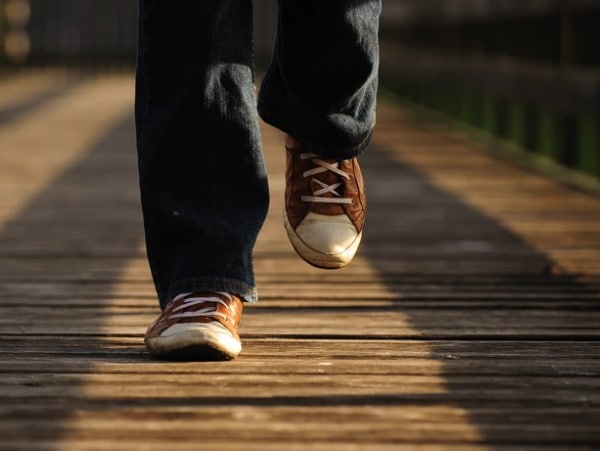Walking is an underrated activity. Sure, we all do it, but mostly to get from point A to point B. Sometimes we might go hiking on a forest trail, but as a pastime, walking is mostly reserved for senior citizens and young couples on their first date. Why walk when you can run, right?
While jogging is a great activity too, walking has many benefits that people don’t often think about. Walking improves mental health, decreases stress, and increases well-being, as well as provides an ideal condition for problem-solving. In fact, there are many more mental benefits of walking. And what’s best, all of these benefits are available to you whether you walk in the city or in the forest.
In this article, I’ll take a look at why walking has fallen out of fashion as an activity and why we should bring it back, as well as some ideas on how to make the most of your walk.
Contents
Walking improves my mental health
In the midst of this global lockdown, I have rediscovered walking as an activity in and of itself, just like many others. That isn’t to say that I didn’t walk before. When possible, I walked to work and ran my errands on foot instead of taking the bus. I would take walks with friends. But I can’t recall taking walks just for the sake of walking and getting outside.
But now that my entire life is confined to my one-bedroom apartment, I’m willing to meander aimlessly through the streets for hours just for a change of scenery. And I’m definitely not alone.
Why walking is less popular nowadays
It’s understandable that walking has fallen out of favor as a pastime. From jogging and yoga to CrossFit and pole fitness, there are literally hundreds of exciting athletic activities to choose from. Our relationship with personal fitness is so much different now than it was a hundred, or even just fifty years ago. We want to be stronger, faster, and more toned, and we want to get there as fast as possible. As a result, walking simply doesn’t cut it anymore.
Walking used to be the athletic activity. According to Wendy Bumgardner, in the second half of the 19th century, walking was the leading sport in Europe and America. Long-distance walkers could earn more per race than basketball players do today.
A hundred years later, in the 1990s, walking was still the most popular form of exercise in the US, if we consider the number of regular walkers (65 million). However, it’s a different story when it comes to respect for the sport. Advertising was geared towards running and professional sports. Just like nowadays, it was reserved for those whose joints couldn’t handle more intensive sports.
Many city marathons now include a walking event, but it’s definitely overshadowed by the runners. Racewalking is an Olympic event, but I bet most people have never seen a walking race.
If you’re as intrigued by the sport as I am, I recommend watching this video by Vox for more information.
I think it’s time we took walking seriously again. While you won’t get killer abs or gain much upper body strength from walking, there are some wonderful mental benefits in it for you. And the good news is that you don’t have to be a competitive walker to reap them.
Mental benefits of walking according to science
According to a 2018 review conducted by scientists from the UK and Australia, walking can have many mental health benefits, including:
- walking alone or in a group can be used as a treatment for depression, and there is some evidence that walking can also prevent depression;
- walking can lower anxiety;
- walking can have a positive effect on self-esteem;
- walking can be used as a potentially promising intervention to decrease psychological stress;
- walking can support and improve psychological well-being;
- walking is associated with higher subjective well-being.
In addition to these areas of mental health, the researchers also studied the effect of walking on resilience and loneliness but found no evidence.
Raymond De Young from the University of Michigan writes that walking can help us cope in this constantly changing world. Mental vitality, which includes creative problem-solving, behavior restraining and planning, and emotion management, is key to flourishing in our environment.
Unfortunately, this resource is depleted rather quickly by modern culture. According to De Young, “the simple activity of walking in natural settings, particularly walking mindfully, may be all that is needed for restoration [of mental vitality]”.
Walking can also have a restorative effect, according to a 2010 study. The researchers compared people with good and poor mental health, and the effect of walking in either rural or urban settings on people’s mood and personal project planning. They found that both urban and rural walks benefited people with poor mental health more, improving their mood and reflection on personal project planning.

Another mental benefit of walking: it’s great for problem-solving
I have found that walking is great for problem-solving. For example, when I run into a creative dead end, I can spend hours in front of the computer in my optimal working conditions, and it won’t help. But a short walk seems to make my brain generate ideas almost too fast for me to keep up. Many people are familiar with this phenomenon that can be explained by different modes of thinking.
According to Barbara Oakley, the author of A Mind for Numbers, when we are struggling to solve a problem, we are in focused mode. Focused mode allows us to concentrate on solving problems that we already know how to solve. For example, when you’re trying to add up numbers, which most people are able to do, focused mode allows you to complete the task quickly and (mostly) correctly.
The other mode, called the diffuse mode, is useful for more creative problem-solving. It allows us to gain new insight into a problem we are struggling with and see the big picture. In diffuse mode, our attention is relaxed and our mind is wandering. It’s precisely this wandering that allows us to find new solutions to old problems.
It should come as no surprise that walking activates the diffuse mode. Wandering around physically also allows your mind to wander, which is not only relaxing but can help you find solutions to your problems.
How to make the most of your walks to become happier
Everyone knows how to take a walk. But there are some things to consider to make the most of your experience.
1. Be consistent
As is the rule with everything else, if you want maximum benefits, you have to be regular and consistent. While a long walk once in a while can clear your head, long-term stress-relieving and mood-boosting benefits come from consistent walks. Why not plan a daily 30-minute walk or a longer walk twice a week.

2. Grab a friend… or don’t
Walking with a friend can make it less boring and make you feel less weird, but if you’re looking to do some thinking while walking then a solitary stroll is the better option. A friend can keep you accountable and make sure you’re really taking the walks you promised to take, but also disturb the wandering of your mind. Whether you should bring company or not depends entirely on your goals.
That said, dog owners are in luck and get the best of both worlds – company with no conversation.
3. Leave the earbuds at home
If you’re like me, you like to bring your soundtrack with you wherever you go. I got into the habit of listening to music while outside in high school, when music made daily bus rides more bearable.
But when you’re taking a walk, especially in nature, it’s sometimes useful to listen to your surroundings. It helps you to be more mindful and stay in the present, not to mention that being aware of your surroundings is important from a safety standpoint anyway.
💡 By the way: If you want to start feeling better and more productive, I’ve condensed the information of 100’s of our articles into a 10-step mental health cheat sheet here. 👇
This Cheat Sheet Will Help You Be Happier and More Productive
Thrive under stress and crush your goals with these 10 unique tips for your mental health.
Closing words
Walking has an undeservedly low reputation. While it won’t give you the athletic benefits of jogging or weightlifting, it has many mental benefits that people don’t think about. From improving symptoms of depression and anxiety to increasing well-being, and giving you space to think, walking is a great activity. Especially in times when your whole life might be confined to your home.
So when I tell you to take a walk, I only have your best interests in mind!
Do you want to share your own experience on how walking improves your mental health? Did I miss another tip that makes your walks more meaningful and enjoyable? I’d love to hear in the comments below!



Walking also make you feel gratitude. When I see beautiful flowers trees and landscapes I am always so grateful. Gratitude adds to our overall happiness
Thanks for sharing!